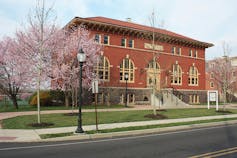I have a vivid primary school memory of playing with another child of similar age who cautioned, “Sister told us not to play with the publics.” The public-private divide still exists today with ongoing debates about funding struggles, comparisons of the quality of infrastructure, values, standards and discipline being discussed and compared.
There is a perception among parents that they will help their children do better academically if they send them to a non-government school.
Lately, a new debate has surged with the comparison of educational outcomes questioning which system produces the better student. When weighing up such serious financial and life decisions parents need to go directly to the evidence.
Do non-government school students have an advantage in their school years?
PISA results from 2012 show that independent schools do better than Catholic schools, which in turn do better than government schools. However, when school-level socioeconomic background is taken into account, the differences in performance across school sectors are not significant.
A recent study by researchers at UQ, Curtin and USQ has allowed the simmering educational debate to come to the boil again. Drawing on data from the Longitudinal Study of Australian Children, it finds that sending children to Catholic or other independent primary schools has no significant effect on cognitive or non-cognitive outcomes.
What is interesting is that researchers aligned this study with evidence from the US and UK and were able to draw the same conclusions. That is, for students attending non-government schools the returns are no different to public schools.

Interestingly, when the researchers controlled for unobserved individual heterogeneity (where unobserved variables such as “effort” are correlated with observed variables like academic test results) into account, the cognitive outcomes for students from Catholic schools were in fact worse than students from public schools.
Again these findings were in keeping with the outcomes from similar studies undertaken in the UK and US.
According to recent media reports, 30 studies have been published in the past 15 years that provide evidence that public schools are achieving similar if not superior results to private schools.
What are the post-school outcomes for non-government school students?
Last year in a piece for The Conversation, schools researcher Barbara Preston cited a number of studies, both in Australia and the UK, that concluded that state school students do better at university than private school students when they enter an institution with the same tertiary entrance score.
As early as 1985, a study concluded after three years of analysis that students from government schools entering Monash University performed better in their first year than students with the same entrance score from independent schools.
Other studies proved that outcomes at university could differ according to the type of high school a student attended.
In fact, it was demonstrated that attending a non-government school had a relatively large negative impact on the marks students could achieve at university – their marks were three percentage points lower than their government counterparts.
The Monash study revealed students from non-selective government schools achieved five marks higher at the end of the first year.
This isn’t just an Australian phenomenon. Similar studies in the UK have also found that students from government-funded schools with lower Year 12 results performed much better at university.
Why don’t additional resources translate to greater learning?
What is frustrating is that these studies do not go further to explain why. If students from independent schools were afforded additional educational resources why would they not continue to succeed or exceed their government peers?
These outcomes have significant implications for government policy, government funding, university choice, tertiary funding of equity programs, parental choice, family budgets and life-long educational decisions.

Evidence overwhelmingly points to the fact that when presenting at the tertiary level with similar scores the students from government schools do better. Unfortunately, we do not appear to be any closer to answering the large issue of why is this so.
We can speculate reasons for this dichotomy - perhaps resilience factors, motivation, unrealistic aspirations or the possibility that the students’ tertiary scores are not in fact equal when entering the university.
Other factors, which may impact on the first year of tertiary study, include independence, study habits, lifestyle, ambition and preparation for university life.
There is no denying that non-government systems provide quality education and it would be simplistic to equate the findings of the recent studies to all schools, universities and students, but it does provide interesting evidence for future policy development and school funding arrangements.

